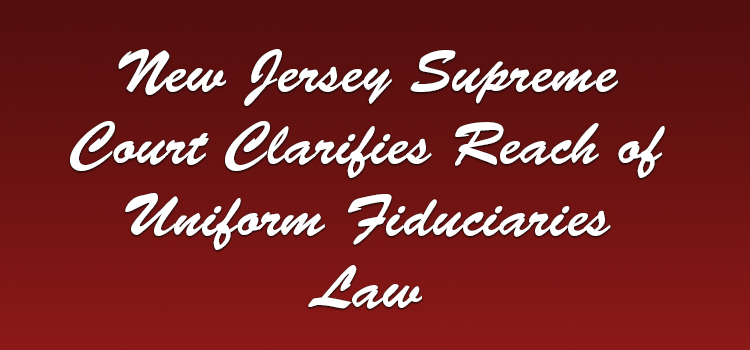In Lembo v. Marchese, (A-92-18/082930) (Decided June 17, 2020), the Supreme Court of New Jersey held that the New Jersey Uniform Fiduciaries Law (UFL) does not authorize an affirmative cause of action against a bank. Rather, it provides a bank with a limited immunity from liability for failing to take notice of and action on the breach of a fiduciary’s obligation.

Facts of Lembo v. Marchese
Two employees of plaintiff Dr. Dominick Lembo, a dentist and owner of plaintiff Belmont Dental Associates (Lembo), forged indorsements on checks payable to the dental practice and deposited them into their personal accounts at defendant TD Bank National Association (TD Bank). Lembo filed common law causes of action against TD Bank, which included counts for conversion and negligence. Lembo did not file an action for conversion under the Uniform Commercial Code (UCC) within the three-year limitations period. Had Lembo done so, TD Bank would have been strictly liable for depositing or cashing those checks, subject to the defenses in N.J.S.A. 12A:3- 405 or N.J.S.A. 12A:3-406.
The trial court granted TD Bank’s motion to dismiss the complaint for failure to state a claim, finding that Lembo had no banking or “special relationship” with TD Bank to sustain the common law causes of action. The court also rejected Lembo’s argument that the Uniform Fiduciaries Law (UFL), N.J.S.A. 3B:14-52 to -61, provided an affirmative cause of action against the bank. The Appellate Division reversed, reading into the complaint the basis for an affirmative UFL claim, and remanded to allow Lembo to amend the complaint to assert such a claim.
NJ Supreme Court’s Decision in Lembo v. Marchese
The New Jersey Supreme Court reversed, concluding thatthe Appellate Division misconstrued the purpose of the UFL. It held that hold that the UFL does not authorize an affirmative cause of action against a bank but rather provides a bank with a limited immunity from liability for failing to take notice of and action on the breach of a fiduciary’s obligation.
“The Legislature enacted the UFL not to create an affirmative cause of action against a bank but to provide a defense when the bank is sued for failing to take notice of and action on the breach of a fiduciary’s obligation. The UFL confers a limited immunity on a bank, unless the bank acts in bad faith or has actual knowledge of a fiduciary breach,” Justice Barry Albin wrote. “We hold that no affirmative cause of action arises under the statute. Whether a UFL claim was adequately pled is therefore a moot issue. Recognizing the predominant role the UCC plays in assigning liability for the handling of checks, we also find that Lembo had no ‘special relationship’ with the bank to sustain the common law causes of action.”
In reaching its decision, the New Jersey Supreme Court found that the plain language of the relevant provisions of the UFL lead to the conclusion that a bank is not liable in a common law cause of action unless it has “actual knowledge” or “notice” of a breach of a fiduciary duty — or acts in “bad faith” in depositing or paying on a check.
As Justice Albin explained, “[n]othing in the plain language of the UFL suggests that the UFL is itself the basis for an affirmative cause of action.” He further noted the “UFL does not provide for a recovery through a private action or set forth remedies or a statute of limitations—all indicia of a statutory cause of action.” According to the court, “[w]hen an action is brought against a bank, the UFL provides that a bank’s liability depends on whether the bank acted with actual knowledge or bad faith in the face of a fiduciary’s breach of his obligations.” The New Jersey Supreme Court concurred with the Appellate Division that Lembo’s common law conversion claim is preempted by the UCC. It also agreed with its conclusion that the common law negligence claim can’t be sustained. As explained by the court, in light of the UCC’s well-delineated scheme assigning and allocating liability in the processing of checks with forged indorsements, “[a]bsent a special relationship, courts will typically bar claims of non-customers against banks.” City Check Cashing v. Manufacturers, 166 N.J. 49 (N.J. 2001). Accordingly, “unless the facts establish a special relationship between the parties created by agreement, undertaking or contact, that gives rise to a duty, the sole remedies available are those provided in the Code.” In this case, the court found that Lembo’s complaint did not allege that Lembo had a banking or other relationship with TD Bank, much less a special relationship “created by agreement, undertaking or contact.”
